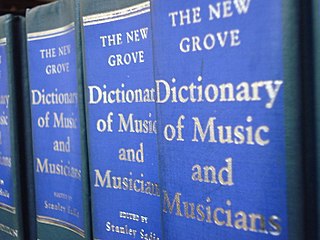
Andrew Lang (1844–1912) was a Scottish poet, novelist, literary critic, and contributor to the field of anthropology. He is best known as a collector of folk and fairy tales. The Andrew Lang lectures at the University of St Andrews are named after him.

The New Grove Dictionary of Music and Musicians is an encyclopedic dictionary of music and musicians. Along with the German-language Die Musik in Geschichte und Gegenwart, it is one of the largest reference works on western music. Originally published under the title A Dictionary of Music and Musicians, and later as Grove's Dictionary of Music and Musicians, it has gone through several editions since the 19th century and is widely used. In recent years it has been made available as an electronic resource called Grove Music Online, which is now an important part of Oxford Music Online.

The Liverpool School of Tropical Medicine (LSTM) is a higher education institution and registered charity located in Liverpool, United Kingdom. Established in 1898, it was the first institution in the world dedicated to research and teaching in tropical medicine. The school has a research portfolio of over £220 million, assisted by funding from organisations such as the Bill & Melinda Gates Foundation, Wellcome Trust and Department for International Development (DFID).

Sir Charles Norton Edgcumbe Eliot was a British diplomat, colonial administrator and botanist. He served as Commissioner of British East Africa in 1900–1904. He was British Ambassador to Japan in 1919–1925.
Bacteriophage (phage) are viruses of bacteria and arguably are the most numerous "organisms" on Earth. The history of phage study is captured, in part, in the books published on the topic. This is a list of over 100 monographs on or related to phages.
Albert Potter Wills (1873–1937) was an American physicist who researched magnetic materials and was the PhD advisor of the Nobel Prize winner Isidor Isaac Rabi.

Oscar Baumann was an Austrian explorer, cartographer and ethnographer.

Benjamin Moore, FRS was an early British biochemist. He held the first chair of biochemistry in the UK, and founded the Biochemical Journal, one of the earliest academic journals in the subject.

William Johnston of Woodslee, Bromborough, Cheshire (1841–1917) was an early benefactor of the University of Liverpool in Liverpool, England. He was a wealthy Northern Irish ship owner who began business in Liverpool in 1863. The Johnston Laboratories and the Johnston Chair of Biochemistry were named after him. He funded the Chair as part of a £25,000- philanthropic gift.

Max Carl Wilhelm Weber van Bosse or Max Wilhelm Carl Weber was a German-Dutch zoologist and biogeographer.

Princess Therese of Bavaria was a Bavarian princess, ethnologist, zoologist, botanist, travel writer and leader in social care.

George Malcolm Stratton was an American psychologist who pioneered the study of perception in vision by wearing special glasses which inverted images up and down and left and right. He studied under one of the founders of modern psychology, Wilhelm Wundt, and started one of the first experimental psychology labs in America, at the University of California, Berkeley. Stratton's studies on binocular vision inspired many later studies on the subject. He was one of the initial members of the philosophy department at Berkeley, and the first chair of its psychology department. He also worked on sociology, focusing on international relations and peace. Stratton presided over the American Psychological Association in 1908, and was a member of the National Academy of Sciences. He wrote a book on experimental psychology and its methods and scope; published articles on the studies at his labs on perception, and on reviews of studies in the field; served on several psychological committees during and after World War I; and served as advisor to doctoral students who would go on to head psychology departments.
Jean-Dominique-Philippe-Auguste Vinson was a French physician and naturalist. His father, François-Auguste Vinson (1791-1851), was a noted physician and politician.
John Dow Fisher Gilchrist (1866–1926) was a Scottish ichthyologist, who established ichthyology as a scientific discipline in South Africa. He was instrumental in the development of marine biology in South Africa and of a scientifically based local fishing industry.

Architecture was a monthly magazine on architecture, established by A. Holland Forbes in 1900 with its first issue dated January 15. Each issue was lavishly illustrated with photographs and architectural drawings. The magazine was published by Forbes & Company, Ltd., initially located at 160 Fifth Avenue, New York, and beginning with the issue of May 15, 1907, at 225 Fifth Avenue. A. Holland Forbes was listed on the masthead as the editor until June 15, 1903, when these duties were taken over by a Board of Architects "in the interests of the profession."
William G. Boericke was an Austrian-born American physician and ardent, influential exponent of homeopathic medicine. He is known in the field today as the compiler and editor of the Pocket Manual of Homeopathic Materia Medica. The ninth edition has endured as his most re-published version partly because of its then final inclusion of a mini-repertory by his brother, Oscar Eugene Boericke, MD, also a homeopathic physician.

Walter Myers BSc, MA, MB BChir, MRCS, LRCP was a British physician, toxicologist and parasitologist who died of yellow fever aged 28 while studying the disease in Brazil.
Norval Bertrand "Speed" Langworthy was a lyricist, newspaper magnate, international relations expert, and advertising account executive.
John Bruce Williamson KC (1859–1938) was a British barrister and historical author.
















